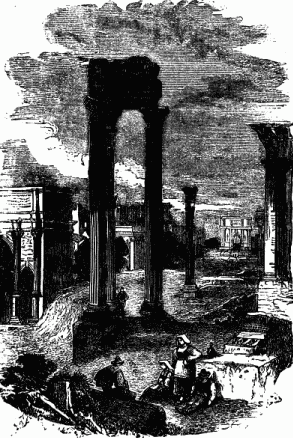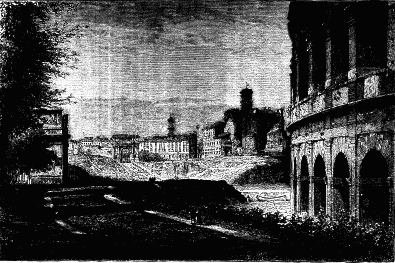
Rome was left to the enemy, except for the small garrison in the Capitol and for eighty of the senators, men too old to flee, who devoted themselves to the gods to save the rest, and, arraying themselves in their robes—some as former consuls, some as priests, some as generals—sat down with their ivory staves in their hands, in their chairs of state in the Forum, to await the enemy.

In burst the savage Gauls, roaming all over the city till they came to the Forum, where they stood amazed and awe-struck at the sight of the eighty grand old men motionless in their chairs. At first they looked at the strange, calm figures as if they were the gods of the place, until one Gaul, as if desirous of knowing whether they were flesh and blood or not, stroked the beard of the nearest. The senator, esteeming this an insult, struck the man on the face with his staff, and this was the sign for the slaughter of them all.
Then the Gauls began to plunder every house, dragging out and killing the few inhabitants they found there; feasting, revelling, and piling up riches to carry away; burning and overthrowing the houses. Day after day the little garrison in the Capitol saw the sight, and wondered if their stock of food would hold out till the Gauls should go away or till their friends should come to their relief. Yet when the day came round for the sacrifice to the ancestor of one of these beleaguered men, he boldly went forth to the altar of his own ruined house on the Quirinal Hill, and made his offering to his forefathers, nor did one Gaul venture to touch him, seeing that he was performing a religious rite.
The escaped Romans had rested at Ardea, where they found Camillus, and were by him formed into an army, but he would not take the generalship without authority from what was left of the Senate, and that was shut up in the Capitol in the midst of the Gauls. A brave man, however, named Pontius Cominius, declared that he could make his way through the Gauls by night, and climb up the Capitol and down again by a precipice which they did not watch because they thought no one could mount it, and that he would bring back the orders of the Senate. He swam the Tiber by the help of corks, landed at night in ruined Rome among the sleeping enemy, and climbed up the rock, bringing hope at last to the worn-out and nearly starving garrison. Quickly they met, recalled the sentence of banishment against Camillus, and named him Dictator. Pontius, having rested in the meantime, slid down the rock and made his way back to Ardea safely; but the broken twigs and torn ivy on the rock showed the Gauls that it had been scaled, and they resolved that where man had gone man could go. So Brennus told off the most surefooted mountaineers he could find, and at night, two and two, they crept up the crag, so silently that no alarm was given, till just as they came to the top, some geese that were kept as sacred to Juno, and for that reason had been spared in spite of the scarcity, began to scream and cackle, and thus brought to the spot a brave officer called Marcus Manlius, who found two Gauls in the act of setting foot on the level ground on the top. With a sweep of his sword he struck off the hand of one, and with his buckler smote the other on the head, tumbling them both headlong down, knocking down their fellows in their flight, and the Capitol was saved.
By way of reward every Roman soldier brought Manlius a few grains of the corn he received from the common stock and a few drops of wine, while the tribune who was on guard that night was thrown from the rock.
Foiled thus, and with great numbers of his men dying from the fever that always prevailed in Rome in summer, Brennus thought of retreating, and offered to leave Rome if the garrison in the Capitol would pay him a thousand pounds' weight of gold. There was treasure enough in the temples to do this, and as they could not tell what Camillus was about, nor if Pontius had reached him safely, and they were on the point of being starved, they consented. The gold was brought to the place appointed by the Gauls, and when the weights proved not to be equal to the amount that the Romans had with them, Brennus resolved to have all, put his sword into the other scale, saying, "Væ victis"—"Woe to the conquered." But at that moment there was a noise outside—Camillus was come. The Gauls were cut down and slain among the ruins, those who fled were killed by the people in the country as they wandered in the fields, and not one returned to tell the tale. So the ransom of the Capitol was rescued, and was laid up by Camillus in the vaults as a reserve for future danger.
This was the Roman story, but their best historians say that it is made better for Rome than is quite the truth, for that the Capitol was really conquered, and the Gauls helped themselves to whatever they chose and went off with it, though sickness and weariness made them afterwards disperse, so that they were mostly cut off by the country people.
Every old record had been lost and destroyed, so that, before this, Roman history can only be hearsay, derived from what the survivors recollected; and the whole of the buildings, temples, senate-house, and dwellings lay in ruins. Some of the citizens wished to change the site of the city to Veii; but Camillus, who was Dictator, was resolved to hold fast by the hearths of their fathers, and while the debate was going on in the ruins of the senate-house a troop of soldiers were marching in, and the centurion was heard calling out, "Plant your ensign here; this is a good place to stay in." "A happy omen," cried one of the senators; "I adore the gods who gave it." So it was settled to rebuild the city, and in digging among the ruins there were found the golden rod of Romulus, the brazen tables on which the Laws of the Twelve Tables were engraved, and other brasses with records of treaties with other nations. Fabius was accused of having done all the harm by having broken the law of nations, but he was spared at the entreaty of his friends. Manlius was surnamed Capitolinus, and had a house granted him on the Capitol; and Camillus when he laid down his dictatorship, was saluted as like Romulus—another founder of Rome.
The new buildings were larger and more ornamented than the old ones; but the lines of the old underground drains, built in the mighty Etruscan fashion by the elder Tarquin as it was said, were not followed, and this tended to render Rome more unhealthy, so that few of her richer citizens lived there in summer or autumn, but went out to country houses on the hills.
